
 i_need_contribute
i_need_contribute

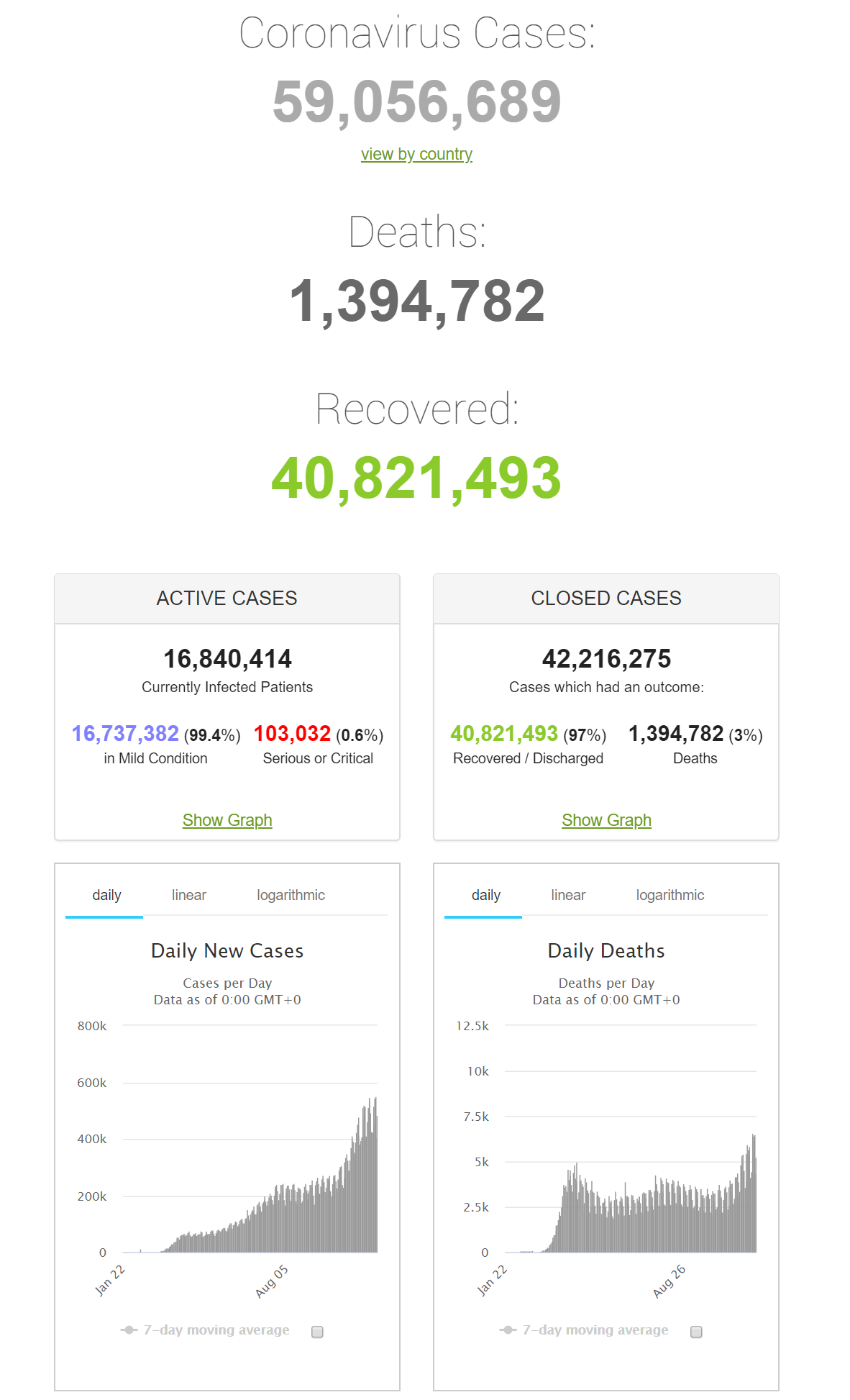
|
Country, |
Total |
New |
Total |
|
World |
58,970,952 |
+489,395 |
1,393,232 |
|
12,589,088 |
+137,010 |
262,701 |
|
|
9,140,312 |
+44,404 |
133,773 |
|
|
6,071,401 |
+18,615 |
169,197 |
|
|
2,140,208 |
+13,157 |
48,732 |
|
|
2,089,329 |
+24,581 |
36,179 |
|
|
1,589,219 |
+15156 |
42,619 |
|
|
1,512,045 |
+18,662 |
55,024 |
|
|
1,408,868 |
+28,337 |
49,823 |
|
|
1,370,366 |
+4,184 |
37,002 |
|
|
1,248,417 |
+7,924 |
35,287 |
|
|
1,032,688 |
+6,719 |
101,373 |
|
|
949,670 |
+1,589 |
35,595 |
|
|
932,111 |
+13,840 |
14,343 |
|
|
861,331 |
+18,467 |
13,618 |
|
|
854,361 |
+13,053 |
44,802 |
|
|
767,679 |
+2,270 |
20,903 |
|
|
624,744 |
+12,079 |
10,951 |
|
|
556,904 |
+3,224 |
15,522 |
|
|
540,640 |
+1,497 |
15,069 |
|
|
535,321 |
+1,766 |
11,958 |
|
|
497,668 |
+4,360 |
15,884 |
|
|
492,263 |
+1,513 |
7,196 |
|
|
484,648 |
+5,388 |
8,891 |
|
|
447,341 |
+2,060 |
6,388 |
|
|
446,822 |
+6,017 |
12,358 |
|
|
418,818 |
+1,968 |
8,123 |
|
|
418,645 |
+5,837 |
10,047 |
|
|
374,173 |
+2,665 |
7,662 |
|
|
355,258 |
+224 |
5,780 |
|
|
330,503 |
+4,792 |
11,455 |
|
|
328,918 |
+521 |
2,799 |
|
|
324,941 |
+3,979 |
5,316 |
|
|
260,758 |
+4,788 |
3,897 |
|
|
247,188 |
+5,226 |
2,388 |
|
|
220,308 |
+1,669 |
1,321 |
|
|
185,643 |
+767 |
13,201 |
|
|
183,429 |
+5,268 |
2,236 |
|
|
174,618 |
+4,320 |
3,800 |
|
|
158,990 |
+1,205 |
552 |
|
|
154,783 |
+1,206 |
2,957 |
|
|
143,922 |
+68 |
8,904 |
|
|
140,056 |
+322 |
866 |
|
|
Donimican |
138,410 |
+640 |
2,310 |
|
137,229 |
+167 |
236 |
|
|
130,179 |
+2,514 |
1,974 |
|
|
126,224 |
+1,385 |
1,952 |
|
|
125,466 |
+756 |
1,945 |
|
|
123,999 |
+1,564 |
1,096 |
|
|
122,081 |
+721 |
1,380 |
|
|
121,820 |
+1,123 |
2,880 |
|
|
121,120 |
+4,995 |
1,199 |
|
|
118,629 |
+212 |
4,076 |
|
|
116,476 |
+1,193 |
900 |
|
|
113,027 |
+351 |
6,548 |
|
|
105,785 |
+433 |
1,647 |
|
|
104,732 |
+4,048 |
976 |
|
|
104,435 |
+256 |
2,857 |
|
|
103,718 |
+3,308 |
1,353 |
|
|
99,835 |
+400 |
871 |
|
|
97,941 |
+1,252 |
2,149 |
|
|
96,241 |
+984 |
671 |
|
|
93,094 |
+3,196 |
1,131 |
|
|
91,619 |
+1,498 |
1,630 |
|
|
88,711 |
+1,240 |
2,821 |
|
|
86,431 |
+17 |
4,634 |
|
|
85,705 |
+114 |
338 |
|
|
79,246 |
+1,398 |
1,739 |
|
|
77,823 |
+1,015 |
1,089 |
|
|
77,372 |
+968 |
1,380 |
|
|
76,476 |
+619 |
1,657 |
|
|
74,862 |
+1,088 |
2,272 |
|
|
71,644 |
+1,390 |
636 |
|
|
71,617 |
+186 |
603 |
|
|
70,485 |
+850 |
784 |
|
|
70,461 |
+318 |
2,023 |
|
|
69,581 |
+432 |
1,231 |
|
|
66,383 |
+155 |
1,167 |
|
|
65,308 |
+1,024 |
1,052 |
|
|
58,160 |
+12 |
28 |
|
|
54,775 |
+1,096 |
335 |
|
|
54,743 |
+1,112 |
1,511 |
|
|
50,874 |
+157 |
323 |
|
|
47,047 |
+2,307 |
386 |
|
|
37,562 |
+158 |
1,075 |
|
|
32,765 |
+413 |
306 |
|
|
32,761 |
+565 |
699 |
|
|
31,062 |
+409 |
439 |
|
|
30,935 |
+602 |
266 |
|
|
30,733 |
+330 |
505 |
|
|
27,821 |
+15 |
907 |
|
|
21,639 |
+423 |
375 |
|
|
21,138 |
+12 |
131 |
|
|
8,643 |
+187 |
44 |
|
|
5,296 |
+1 |
116 |
|
|
4,731 |
+7 |
45 |
|
|
3,913 |
+11 |
60 |
|
|
1,307 |
+1 |
35 |
Retrieved from: https://www.worldometers.info/coronavirus/
From CNN's Esha Mitra in New Delhi
The Chief Minister of India's Maharashtra state, Uddhav Thackeray, has warned the public to practice Covid-appropriate behavior to avoid a "tsunami" of infections after the festival season.
“The second and third wave of coronavirus that some states are experiencing, if you compare it with previous waves, it’s not a wave but a tsunami," Thackeray said in an address on Sunday, referring to rising infections in Delhi and other states.
He added that Maharashtra has gained some control of the situation -- but cautioned citizens to wear masks and avoid crowds.
"We did bring the numbers down, but I had said before itself that we need to take extra precautions during Diwali ... but crowding did increase, so don’t think that the threat of coronavirus is gone," he said.
Maharashtra, India's second most populous state, has reported more than 1.78 million Covid-19 cases. The state's death toll stands at 46,623, according to the Indian Ministry of Health.
From CNN's Jenn Selva in Los Angeles
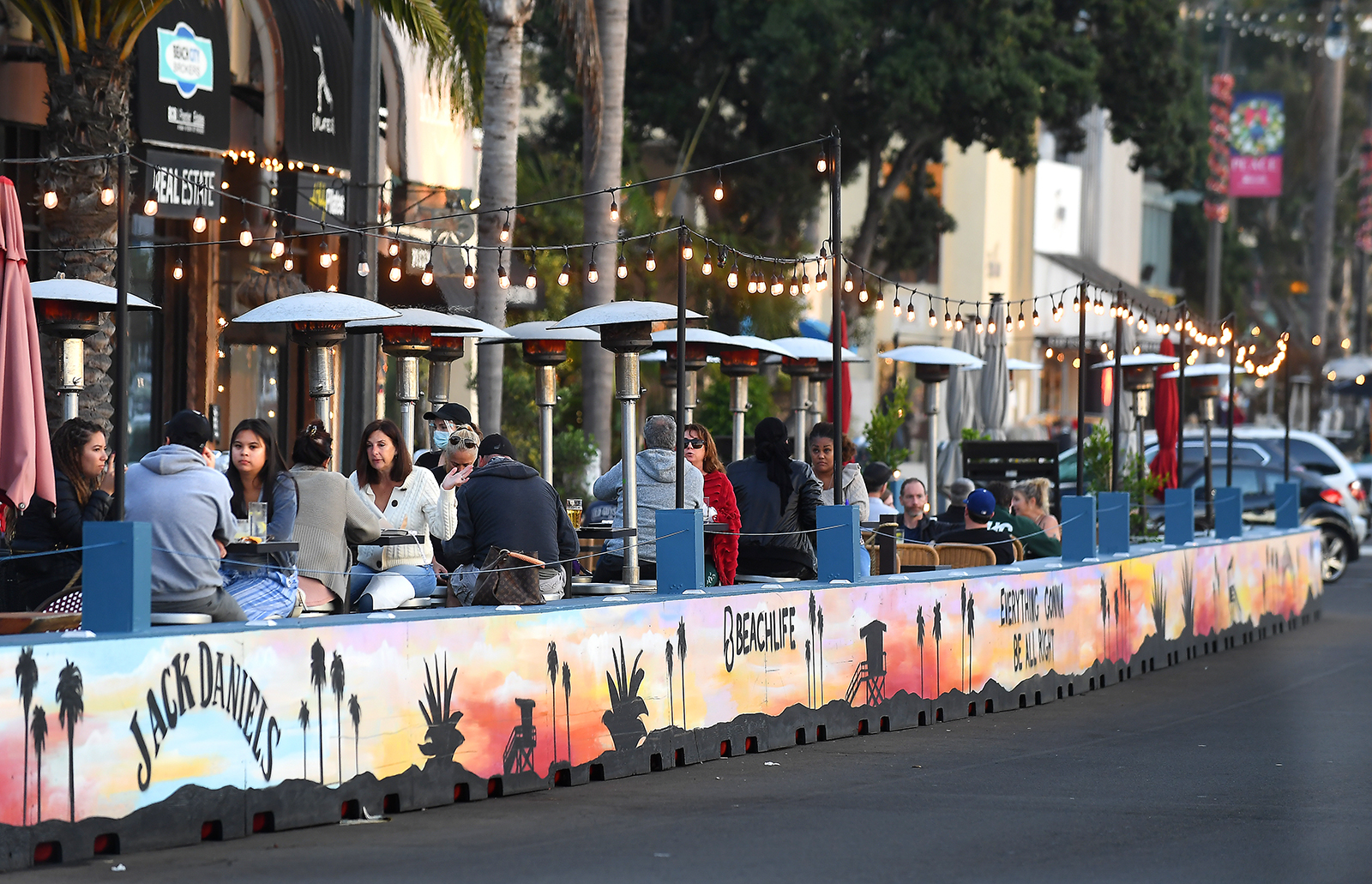
Customers dine in the Hollywood Riviera area of Redondo Beach, California, on November 15.
Outdoor dining in Los Angeles County will be shut down as the five-day average of new Covid-19 infections has passed 4,000 daily cases, according to a news release from the Los Angeles County Department of Public Health.
The order, which will go into effect on Wednesday November 25 at 10 p.m., also includes dining at breweries, wineries, and bars.
“To reduce the possibility for crowding and the potential for exposures for people in settings which are not wearing their face coverings, restaurants, breweries, wineries and bars will only be able to offer take out, drive through and delivery services,” the release said.
The five-day average of new cases is at 4,097. If the five-day average number reaches 4,500 or hospitalizations reach 2,000 a Targeted Stay at Home Order will be issued for three weeks, according to the release.
There are currently 1,401 people hospitalized with the disease in the county, with 26% of those in the ICU, the release said.
From CNN's Marnie Hunter
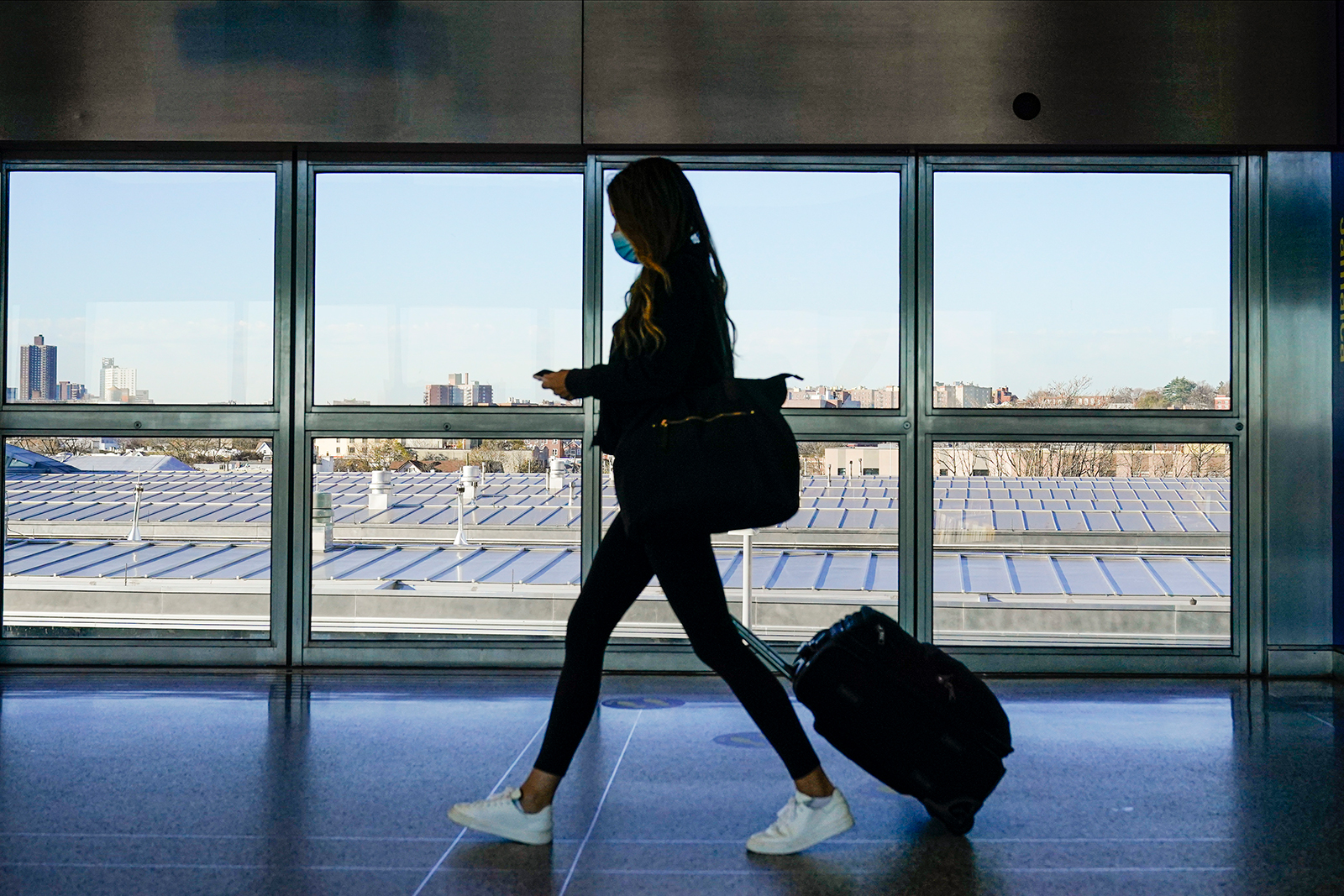
A traveler approaches the AirTrain to JKF International Airport in New York, on November 20.
Thanksgiving travel is surging as new coronavirus cases approach 200,000 a day in the United States.
The US Centers for Disease Control and Prevention issued guidance on Thursday urging Americans not to travel for Thanksgiving. But millions of people are still planning to travel over the holiday week.
On Friday, the number of travelers screened at US airport security checkpoints topped 1 million for only the second time since March, according to Transportation Security Administration figures. That's still just 40% of the volume screened on the Friday before Thanksgiving a year ago.
Many weary Americans eager to join family and friends for Thanksgiving face another risk calculation as they weigh scrapping travel plans at the last minute or going ahead as Covid-19 cases surge.
Gail Duilio, a retired public health nurse in Portland, Oregon, has canceled her flight to Minnesota for the holiday and her mother's 93rd birthday.
"When making the arrangements a month ago, I felt the risks vs. benefits weighed on the side of going," she told CNN. This week, the risks tipped the scales in the other direction for her.
Travel organization AAA has said that it expects at least a 10% drop in travel this Thanksgiving because of spiking coronavirus cases, shifting travel restrictions and calls by health and government officials for people to stay home.
AAA forecasts nearly 48 million travelers will drive to their destinations -- representing a 4.3% drop from last year in the number of people traveling by car over the holiday period, which AAA defines as Wednesday to Sunday.
Air travel is expected to see its largest one-year decrease on record for Thanksgiving, a nearly 48% drop, with just 2.4 million travelers expected to fly, according to the organization.
Retrieved from: https://edition.cnn.com/world/live-news/coronavirus-pandemic-11-23-20-intl/index.html
Helen Sullivan and agencies
As G20 leaders pledged to ensure the equitable distribution of Covid-19 vaccines, drugs and tests so that poorer countries are not left out, the US, UK and Germany each announced plans to begin vaccinations in their countries in December, while Spain said it would start administering the vaccine to its citizens in January.
Britain could give regulatory approval to Pfizer-BioNTech’s Covid-19 vaccine as early as this week, even before the US authorises it, the UK’s Telegraph newspaper reported on Sunday. Pfizer and BioNTech could secure emergency US and European authorisation for their Covid-19 vaccine next month after final trial results showed a 95% success rate and no serious side effects.
Moderna last week released preliminary data for its vaccine showing 94.5% effectiveness.
The better-than-expected results from the two vaccines, both developed with new messenger RNA (mRNA) technology, have raised hopes of an easing of a pandemic that has killed more than 1.3 million people.
In the US, the head of the US vaccine program, Moncef Slaoui, said the first Americans to receive a vaccine could get it as soon as 11 December, CNN reported on Sunday.
“Our plan is to be able to ship vaccines to the immunisation sites within 24 hours from the approval, so I expect maybe on day two after approval on the 11th or the 12th of December,” he said in an interview to CNN.
Citing government sources, the Telegraph also said the UK’s National Health Service had been told to be ready to administer it by 1 December.
Britain formally asked its medical regulator, the MHRA, last week to assess the suitability of the Pfizer-BioNTech vaccine. The UK Department of Health had no comment on Sunday on when the first vaccinations would be administered.
Britain has ordered 40m doses and expects to have 10m doses, enough to protect 5 million people, available by the end of the year if regulators approve it.
Germany could also start administering shots of Covid-19 vaccines as soon as next month, health minister Jens Spahn was quoted as saying on Sunday. He said Spain and Germany were the first European Union countries to have a complete vaccination plan in place.
“There is reason to be optimistic that there will be approval for a vaccine in Europe this year,” Spahn said in an interview with publishing group RedaktionsNetzwerk Deutschland. “And then we can start right away.”
Spahn said he had asked Germany’s federal states to have their vaccination centres ready by mid-December and that this was going well. “I would rather have a vaccination centre ready a few days early than an approved vaccine that isn’t being used immediately.”
Germany has secured more than 300m vaccine doses via the European Commission, bilateral contracts and options, Spahn said, adding that this was more than enough and even left room to share doses with other countries.
Spain will begin a comprehensive vaccination programme in January and expects to have covered a substantial part of the population within three months, the prime minister, Pedro Sanchez, said on Sunday.
“The campaign will start in January and have 13,000 vaccination points,” Sanchez told a news conference after a two-day online summit of G20 leaders. “A very substantial part of the population will be able to be vaccinated, with all guarantees, in the first quarter of the year.”
Meanwhile, nearly 2bn doses of Covid-19 vaccines will be shipped and flown to developing countries next year in a “mammoth operation”, the UN children’s agency Unicef said on Monday, as world leaders vowed to ensure the fair distribution of vaccines.
Unicef said it was working with more than 350 airlines and freight companies to deliver vaccines and a billion syringes to poor countries such as Burundi, Afghanistan and Yemen as part of Covax, a global Covid-19 vaccine allocation plan with the World Health Organization (WHO).
“This invaluable collaboration will go a long way to ensure that enough transport capacity is in place for this historic and mammoth operation,” said Etleva Kadilli, director of Unicef’s supply division, in a statement.
Covax – co-led by Gavi vaccine group, the WHO and the Coalition for Epidemic Preparedness Innovations – aims to discourage governments from hoarding Covid-19 vaccines and to focus on first vaccinating the most at risk in every country.
Unicef’s role with Covax stems from its status as the largest single vaccine buyer in the world. It said it procures more than 2bn doses of vaccines annually for routine immunisation and outbreak response on behalf of nearly 100 countries.
Retrieved from: https://www.theguardian.com/world/2020/nov/23/us-germany-and-uk-could-start-covid-vaccinations-as-early-as-december
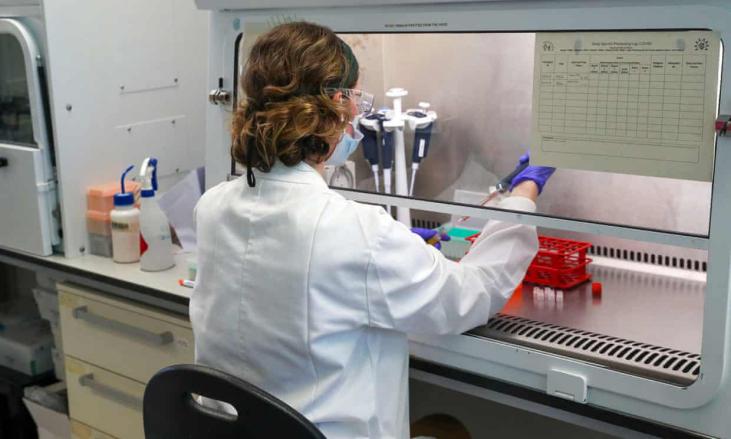
A scientist at work in the laboratory where a vaccine against Covid-19 has been produced at the Oxford Vaccine Group’s facility at the Churchill hospital in Oxford
A coronavirus vaccine developed in the UK can prevent 70.4% of people from getting Covid-19 and up to 90% if a lower dose is used, according to data.
Oxford University and AstraZeneca have announced their jab is effective in preventing many people getting ill and it has been shown to work in different age groups, including the elderly. There are early indications it might also help stop the spread of the disease.
Sarah Gilbert, professor of vaccinology at the University of Oxford, said: “The announcement today takes us another step closer to the time when we can use vaccines to bring an end to the devastation caused by [Covid-19].
“We will continue to work to provide the detailed information to regulators. It has been a privilege to be part of this multi-national effort, which will reap benefits for the whole world.”
Oxford University said interim analysis from its phase 3 vaccine trial showed that the efficacy of their vaccine is 70%. But that came from combining the results of two different dosing regimes, one of which was 90% and the other was 62%. The 90% regime involved a half-dose first and then a full dose of the vaccine later. The interim analysis was based on 131 infections among participants who received the vaccine and those in a control group who were given an established meningitis shot.
In a statement, Prof Andrew Pollard, the director of the Oxford Vaccine Group and chief investigator of the Oxford vaccine trial, said: “These findings show that we have an effective vaccine that will save many lives. Excitingly, we’ve found that one of our dosing regimens may be around 90% effective and if this dosing regime is used, more people could be vaccinated with planned vaccine supply.
“Today’s announcement is only possible thanks to the many volunteers in our trial, and the hard-working and talented team of researchers based around the world.”
He said that if people were first given a half-dose of the Oxford vaccine followed by a full dose a month later, they had 90% protection.
“There is just a hint in the data at the moment that those who got that regime with higher protection, there is a suggestion that it was also able to reduce asymptomatic infection,” he told the BBC Radio 4 Today programme. “If that is right, we might be able to halt the virus in its tracks and stop transmitting between people.”
His colleague, Prof Sarah Gilbert, professor of Vaccinology at the University of Oxford, said: “The announcement today takes us another step closer to the time when we can use vaccines to bring an end to the devastation caused by Sars-CoV-2. We will continue to work to provide the detailed information to regulators. It has been a privilege to be part of this multi-national effort which will reap benefits for the whole world.”
AstraZeneca’s chief executive, Pascal Soriot, said: “Today marks an important milestone in our fight against the pandemic. This vaccine’s efficacy and safety confirm that it will be highly effective against Covid-19 and will have an immediate impact on this public health emergency.
“Furthermore, the vaccine’s simple supply chain and our no-profit pledge and commitment to broad, equitable and timely access means it will be affordable and globally available, supplying hundreds of millions of doses on approval.”
The UK has placed orders for 100m doses of the Oxford vaccine – enough to vaccinate most of the population – with rollout expected in the coming weeks if the jab is approved.
It also has orders for 40m doses of a jab from Pfizer and BioNTech, which has been shown to have 95% efficacy. Another jab from Moderna has 95% efficacy, according to trial data.
Australia has ordered 33.8m doses of the vaccine.
The UK health secretary, Matt Hancock, called the data “really encouraging news”, but stressed that vaccines needed to be approved by the Medicines and Healthcare products Regulatory Agency (MHRA).
“This is really encouraging news on the Oxford AstraZeneca vaccine, that obviously we’ve been backing since the start,” he told Sky News. “And I’m really very pleased, really welcome these figures, this data, that show that the vaccine in the right dosage can be up to 90% effective.
“Of course, it’s vital that the independent regulator, the MHRA, will need to look at the data, will need to check to make sure that it’s effective and safe of course. But we’ve got 100m doses on order and should all that go well, the bulk of the rollout will be in the new year.”
He added: “And of course this vaccine, this homegrown vaccine, is easier to administer as well than the Pfizer vaccine, because it doesn’t need to be stored at -70. So having two vaccines that appear to have effectiveness, done right, in the 90% range is really, really good news.”
Boris Johnson said: “Incredibly exciting news the Oxford vaccine has proved so effective in trials. There are still further safety checks ahead, but these are fantastic results. Well done to our brilliant scientists at UniofOxford & AstraZeneca, and all who volunteered in the trials.”
The business secretary, Alok Sharma, said the results of an interim analysis of the University of Oxford and AstraZeneca’s coronavirus vacccine candidate were “very promising”.
He tweeted: “Very promising data from the Oxford/AstraZeneca Phase III clinical trials. We are on the cusp of a huge scientific breakthrough that could protect millions of lives. The UK has secured early access to 100m doses of their vaccine – on top of 255m doses from other developers.”
Retrieved from: https://www.theguardian.com/society/2020/nov/23/astrazeneca-says-its-coronavirus-vaccine-has-70-per-cent-efficacy-covid-oxford-university
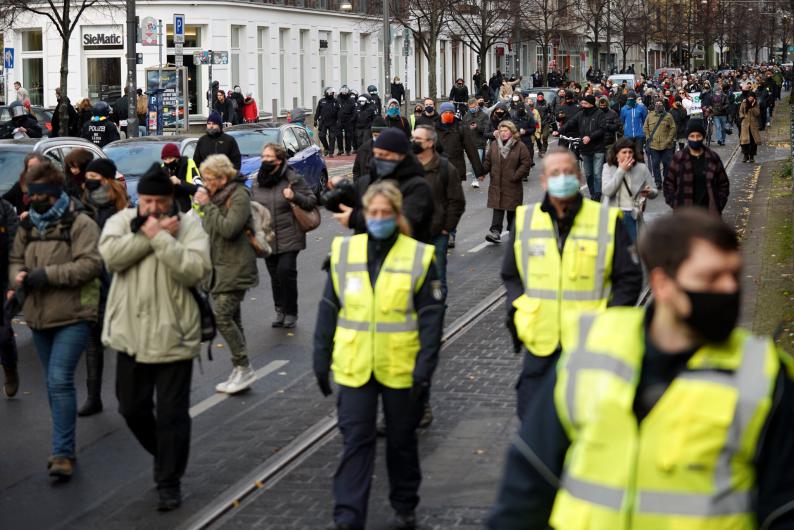
Protesters marched during a demonstration against German coronavirus restrictions in Berlin on Sunday.
A young woman who compared her struggle against German government measures to curb the spread of the coronavirus to that of a student executed in 1943 for resisting the Nazis sparked ridicule and outrage for downplaying the Holocaust.
A video of the woman giving a speech at a protest of several hundred people in Hanover on Saturday quickly went viral. Hundreds of people pointed out that unlike Sophie Scholl, who founded the White Rose resistance in Munich, the woman at the protest was allowed to speak her mind freely without facing repercussions.
The video shows the woman, who identified herself only as Jana from Kassel, saying, “I feel like Sophie Scholl since I have been active in the resistance, giving speeches, going to protest, distributing fliers.” There is scattered applause.
The speech was the latest instance of protesters or conspiracy theorists opposing the coronavirus measures equating the government’s efforts to save lives to the Nazis’ oppression of Jewish people. As the German government has further restricted public life in an effort to tamp down a surge in the number of infections since the middle of October, protests have grown larger, bolder and more violent. From the outset, they have been backed by neo-Nazis and members of far-right groups.
Last week an 11-year-old girl told a crowd that she felt like Anne Frank because she had to hold her birthday party in secret, fearing her neighbors would report the gathering. Several demonstrators have donned yellow stars of David resembling those forced upon Jews in Nazi Germany, stamped with “unvaccinated” in place of “Jude.”
“Whoever compares themselves today to Sophie Scholl or Anne Frank mocks the courage that it took to stand up to the Nazis,” Heiko Maas, Germany’s foreign minister, said on Twitter on Sunday. “This downplays the Holocaust and shows an unacceptable forgetfulness about history.”
“Nothing connects the corona protesters with resistance fighters,” he added. “Nothing!”
The Hanover video also shows that, after the woman spoke of Sophie Scholl at Saturday’s protest, a man in an orange vest approached the stage, saying he had been working as a security guard but was quitting, calling her statement “idiotic” and a “belittlement of the Holocaust.” Two police officers then escorted him from the area as the woman threw down her script and the microphone, burst into tears and fled the stage.
Local media reported on Sunday the man belonged to a leftist organization that had sought to counter the protest against the coronavirus measures.
In another video uploaded about 30 minutes after the initial clip, the same woman could be seen returning to the stage, repeating her statement.
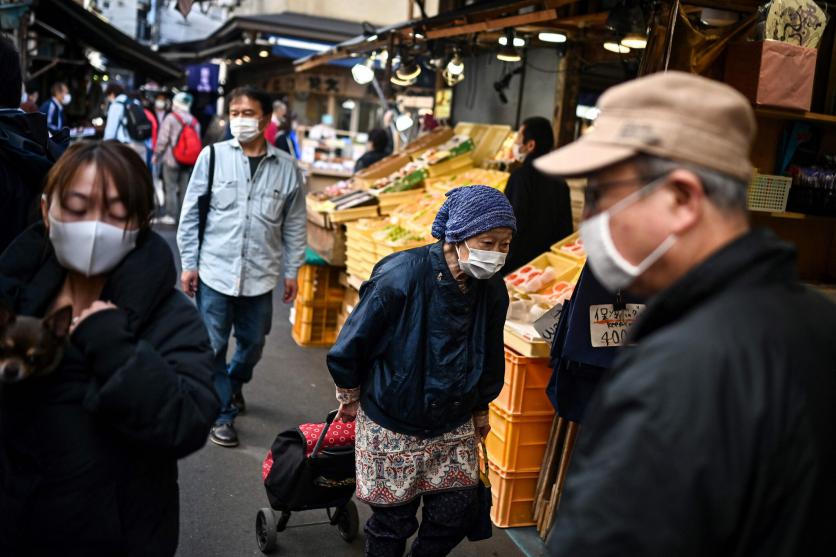
At a market in Tokyo on Saturday.
Coronavirus cases are climbing quickly in Japan and South Korea, two countries that have managed to avoid the worst of the pandemic.
Japan has had its worst-ever jump in new cases, breaking records on four consecutive days, with at least 2,508 new cases on Sunday. Its previous worst spike dropped off after peaking at nearly 2,000 cases in early August.
On Saturday Prime Minister Yoshihide Suga announced that government-funded domestic travel stipends intended to help kick-start the economy would be suspended for some of the hardest hit areas of the country.
South Korea has had a smaller increase, with five straight days of more than 300 cases. Last week new restrictions were announced for Seoul and surrounding areas, including limiting the number of people in mass events such as concerts, conferences and festivals to 100.
South Korea was particularly hard hit at the beginning of the pandemic in February and March. On March 1 it peaked at more than 1,000 new cases. Since then the country has earned praise for bringing its outbreak under control, before enduring another surge in late August.
A South Korean health official warned that the latest surge could become the county’s worst if it is not quickly brought under control.
“We are at a crossroads as we experience a huge nationwide wave that may outclass the previous tides,” Lim Sook-young, a Korean Disease Control and Prevention Agency official, said Saturday, the Yonhap News Agency reported.
More than 500 people have died in the outbreak in South Korea this year.
Retrieved from: https://www.nytimes.com/live/2020/11/22/world/covid19-coronavirus/coronavirus-cases-are-rising-again-in-south-korea-and-japan
· Victoria and NSW both recorded no new cases, while SA recorded one new case, with a known source
· The Victorian government announced plans to fund sick and carers leave for casual and insecure workers, putting it on a collision course with the federal government
· NSW announced a further easing of restrictions from Wednesday, while QR codes will also become mandatory in all businesses
· Traffic began flowing freely along the NSW-Victoria border on Monday